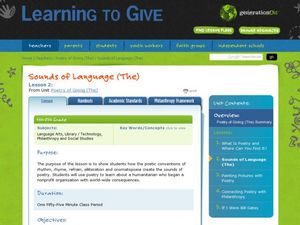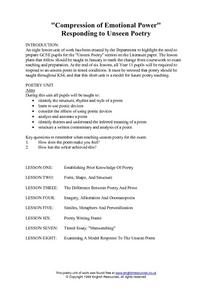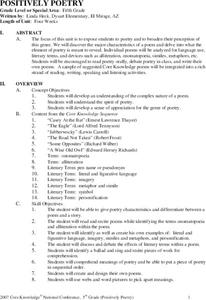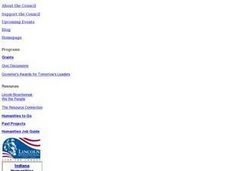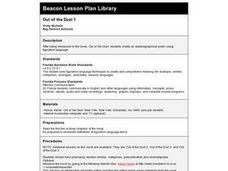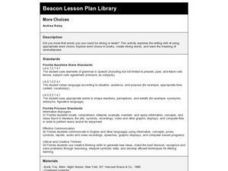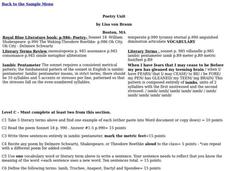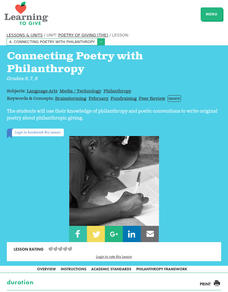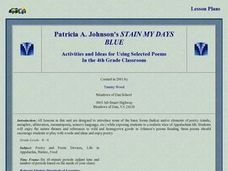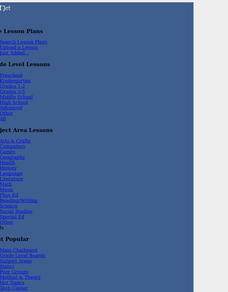Curated OER
Poetry Beyond Words
Participate in writing poetry as a group. Focused on a given theme, young writers compose a popcorn poem using sensing verbs and adverbs. They write popcorn poems, onomatopoeias, collective poems, and diamond poems. You could introduce...
Georgia Department of Education
Exploring Poetry and Poets
Combine the study of poetry and non-fiction texts with this complete and ready-to-use six-week unit. After reading numerous poems from local writers and compiling a personal anthology, high schoolers find and read a memoir or biography...
Curated OER
Poetry Project
Choosing a poet or a theme, eighth graders conduct research in the world of poetry. They conduct Internet research and select five poems that fit their poet or theme, and create a seven slide PowerPoint presentation on their selected...
Curated OER
Poetry: A Picture of Feelings
Students take a field trip to a place of interest. After the trip they share with a partner their most memorable memory about it. Later, they paint a picture representative of the trip and illustrate it with a poem using at least two...
Curated OER
The Poetry of Giving
Learn about philanthropy and poetic conventions with an inclusive lesson about Bill Gates. After learning about Mr. Gates' humanitarian efforts in the world, sixth graders use alliteration, onomatopoeia, rhyme, rhythm, and refrain in...
Curated OER
Edward Lear, Limericks, and Nonsense
Introduce your class to the delights of nonsense poetry and explore literary devices with the writing of Edward Lear. Learners identify rhyme and meter as well as figures of speech, alliteration, and onomatopoeia in "The Owl and the...
Curated OER
Pictures in Words: Poems of Tennyson and Noyes
Students examine how Tennyson and Noyes use words to paint vivid pictures. They read and analyze two poems, complete an online scavenger hunt, complete a worksheet, and write examples of alliteration, personification, metaphor, simile,...
Curated OER
Pictures in Words: Poems of Tennyson and Noyes
Students analyze poems by Tennyson and Noyes. They identify examples of alliteration, onomatopoeia, personification, metaphor, and simile. Students create examples of alliteration, onomatopoeia, personification, metaphor, and simile.
Curated OER
"Compression of Emotional Power"--Responding To Unseen Poetry
Eleventh graders identify the structure, rhythm and style of a selected poem, experience utilizing poetic devices and analyze an annotated poem. They evaluate the themes and inferred meanings to a variety of poems from their textbooks.
Curated OER
Reading, Writing, Reciting Exciting Poetry!
Students complete a poetry analysis unit. In this poetry analysis lesson, students study poetry by reading, reciting, and analyzing poems and their poets. Students study poetic devices, write their own poems, and complete hands-on...
Curated OER
Connecting Poetry with Philanthropy
Students use their knowledge of philanthropy and poetic conventions to write original poetry about philanthropic giving. In this philanthropy lesson, students write poetry based on philanthropy using poetic conventions. Students...
Curated OER
Positively Poetry
Students complete a unit on poetry. In this poetry lesson, students complete 19 lessons that focus on reading and writing poetry as well as learning about literary elements and sound devices. Students read poetry orally, debate poetry in...
Reed Novel Studies
Old Wolf: Novel Study
Do wolves ever attack humans? An informative novel study for Old Wolf helps pupils conduct research to answer the question. They also decode anagrams, learn about onomatopoeia, and write quatrain poems about themes from the novel.
Curated OER
Personalized Poetry Portfolio
Eighth graders create their own poetry portfolio containing poems that relate to Students' lives and families. The portfolio consist of the following types of poems: acrostic, diamante`, haiku, cinquain, and free verse.
Curated OER
Poetry of Abraham Lincoln
Fourth graders analyze Abraham Lincoln's poems "The Bear Hunt" and "My Childhood's Home" for word choice and deeper inquiry into the vocabulary he uses to convey emotion. They identify rhyming words and patterns in these poems. ...
Curated OER
Out of the Dust 1
Students review figurative languages terms and examples. They read the first entry in the book, Out of the Dust, and discuss the images created by the author. Then they create an autobiographical poem using figurative language.
Curated OER
More Choices
Fourth graders create onomatopoeia for a variety of things such as a mean dog, a crying baby or a doorbell ringing after exploring word choice as used by authors in selected books. They complete a Word Choice worksheet that is attached.
Curated OER
The Power of Poetry
Learners utilize the Internet to research figures of speech used in poetry and poetry terms
Curated OER
Emotion Similes
Students define what a simile is before writing a poem that is based primarily on similes. They brainstorm and write the poem using the give format. They write drafts, revise and present a final poem.
Curated OER
Poetry Unit
Students, after examining three forms of poetry, review and document a variety of literary terms. Vocabulary words are enveloped into the literary terms as well and are cited from each selection by each student.
Curated OER
Connecting Poetry with Philanthropy
Students examine the different types of poetic conventions. They write a poem about philanthropy using these conventions. They illustrate their poem with artwork of their choice.
Curated OER
Stain My Days Blue
Students read several poems related to the life and culture of the Appalachia region. They are introduced to the poetic forms of simile, alliteration and onomatopoeia and respond to the poems through journal entries and poetry of their own.
Curated OER
Figurative Language Scavenger Hunt
Eighth graders analyze and interpret figurative language. They listen to some examples of poetry which use figurative language. Then, they divide into groups and attempt to find more examples. Finally, 8th graders write what the poet is...
Curated OER
Out of the Dust 4
Eighth graders read the novel, "Out of the Dust," and create a free-verse poem about a treasure of their own. They use the attached checklist to evaluate their own poem.




